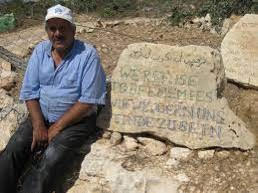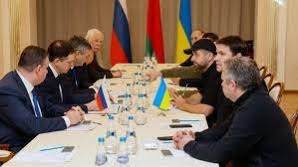Friends,
Like you, we have been waking up to news alerts about Ukraine and going to sleep confused and with prayers of lament. Things are not as they should be.
In the midst of the dissonance, we are invited to reflect on geopolitical events through a lens unique to the ethic of peace and interdependence modeled in Jesus’ life, death and resurrection. We don’t pretend to have all the answers (or any for that matter!), but we want to take a moment to invite you into some of the questions we are asking in this complex and tragic moment in history. Our hope is that you know you’re not alone in the questions and find our interaction with them as constructive and practical in our shared commitment to becoming Everyday Peacemakers.

The Problem of Peace.
It’s relatively easy to be a proponent of peacemaking when bombs aren’t dropping on civilians. But, when a clear injustice is taking place and the tanks are rolling over any clear pathway toward nonviolent de-escalation (civil disobedience, diplomacy, etc), how does our theology and practice of peacemaking hold up? Is a theology of peace and nonviolence a convenient ideal propagated behind pulpits and in lecture halls or the necessary pathway toward justice that may cost us our lives?
More specifically, how much of our ethic of nonviolence is a result of our privilege and lack of proximity to violence? If our homes – or countries – were being invaded how might we reflect on a nonviolent ethic? What is our channel for justice when no one has our back? With these questions, we turn to our relatives of color whose homes are being invaded without a prayer for justice. We seek counsel from them and beg them to teach us the ethic of nonviolence that dictates their survival.
We believe that war undoes humanity. It is antithetical to the kingdom announced and embodied in Jesus. AND, it’s complex. If we don’t name the complexity for what it is, we can fall victim to pious pontification rather than proximate solidarity with those on the underside of power. In our work and relationships in Palestine, on the Mexico/US border and within the racial injustices in our own cities, we have been forced to confront the reality beyond our ideology. And yet, as many of these peacemakers endure violence, they combat it with creative love. Our Palestinian friends, Daoud and Daher Nasser are still recovering from hospitalization as a result of an “enemy” attack on their family. As followers of Jesus, their convictions around peace and nonviolence remain unshakable as they respond, “We refuse to be enemies.”
If we say we believe in peacemaking, we have to name the complexities and ask the hard questions. Not as a way to excuse violence, but as the path for deepening our conviction that peacemaking is worth our lives.
Our View as Global Citizens.
No matter our national citizenship, our primary citizenship is to the kingdom of God. As a result, we are to SEE the humanity, dignity and image of God in all those impacted by violence…both the oppressed and oppressors. We can’t allow our inherited national narrative or preferred news outlet to determine where we lament injustice and where we ignore it. While we actively participate in seeing and supporting those broken by violence in Ukraine, we don’t lose sight of the years of violence imposed on the people of Yemen at the hands of Saudi Arabia. We remain in solidarity with Palestinians living under Israeli military occupation. We expose the broken systems of police brutality in our own country that’s extinguished far too many black and brown lives.
As followers of Jesus, the “allies and enemies” of the United States can’t determine where we see injustice and how we give our lives to undo it on behalf of the oppressed. Finally, as citizens of one of the world’s biggest superpowers, we have been on the wrong side of history far too many times to allow our national narrative to shape our view of the world.

War and Patriarchy.
About a decade ago, we were walking through the Old City of Jerusalem when an elderly Palestinian woman offered us a profound and prophetic word. Stepping away from her business selling grape leaves, she said, “Here men make war and women make peace.”
Prophecy is less about trying to determine the future and more about exposing the truth that is already right in front of us.
The prophetic truth is that throughout history, men in power start and sustain the vast majority of wars on this planet. Whether it is ego, toxic forms of masculinity or using religion to “bless” their violence, we are in desperate need of following the wisdom of women in leadership. Last week, we saw the picture of the “peace negotiations” between Ukraine and Russia and it was of more men seeking to undo the war created by men. This is a problem.
If there is anything we are learning, it’s that we must name and confront that patriarchy is an obstacle to peace. As two white men, we know all too well how this can inform our own leadership intuition and understand the importance of truth telling, confession and accountability. What if our global diplomacy began to place the wisdom of women at the center of the peace negotiations as the necessary path away from war?
Local Practice Beyond Borders.
As Everyday Peacemakers, we don’t just keep up with the news, we consider how our lives intersect with the beauty and brokenness of our world.
Our friend from Bethlehem, Sami Awad would always tell our delegations who met with him in the West Bank, “Don’t bring our conflict home with you.” In other words, don’t extend the power of the conflict (in this case, Palestine/Israel) by bringing home ideologies that divide our families, friends and communities. This past week has made that warning all the more real for us here in the United States as local Russian business owners are receiving hate speech and vandalism.
Critiquing the Russian government is justified, but how can we do that without demonizing its people? We are invited to stand in solidarity on our streets with those experiencing hate as a result of this war.
A few closing questions for reflection and action:
- How might we interrogate our personal tendency toward domination? How has our inherited theology affirmed it?
- How have we sought to dominate in our personal relationships in ways that are harmful and in need of repentance?
- Where are the Russian and Ukrainian communities in our cities and how can we support them today?
- What is one way to hold our elected officials accountable (voting, calls, letters, etc) to a political ethic that is generous, sacrificial and beneficial to our neighbors near and far?
Like we said at the start, we don’t have the answers, but we are committed to asking the hard questions and learning from each other along the way. Much love to you all and don’t hesitate to be in touch as we press on in our commitment to be Everyday Peacemakers in the midst of our very conflicted world.
Jon and Jer

